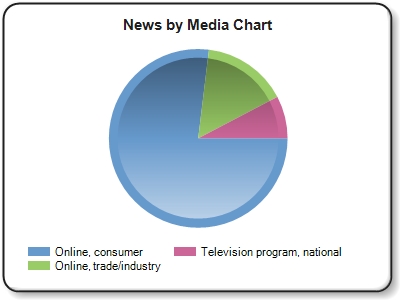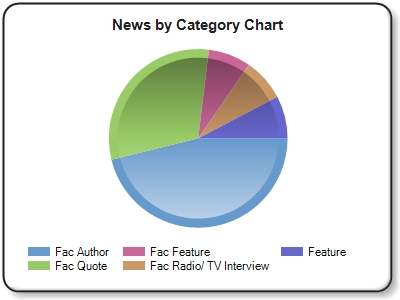Top Story
| Detroit Debate Offers Second Chance for Biden, Last Chance for Many Other Dems |
| Jason Mollica, professorial lecturer of communication, spoke to Sinclair Broadcasting Group about performance expectations for former Vice President Joe Biden and Senator Kamala Harris during the second Democratic debates. Mollica said, “If Biden is neither focused nor engaged, it could be a bad sign as he tries to show Democrats he should be the candidate to face Trump in 2020.” Mollica also discussed issues from the first night of debates. The interviews ran in several Sinclair-affiliated stations, including WJLA. Additionally, Distinguished Professor of History Allan Lichtman wrote an article for The Hill about the ideal show-off at the Democratic primaries, and Vox cited a tweet from Betsy Fischer-Martin, executive director of the Women & Politics Institute, about the lack of discussion about women-centric issues at the second Democratic Debates. (7/29, 7/30, 8/1) |
Additional Features
| Out From The Shadows: Montgomery County's Historic Black Communities Are The Focus of New Exhibit |
| WAMU-FM featured ‘Plans to Prosper You,' a student-created exhibit on display at the American University Museum at the Katzen Arts Center. The exhibit is on display until Aug. 11, after which some artifacts will be made available online. Pine said, “What we'll do is cross-link on the Historic African River Road Connections (HARRC) collection at the American University archives, as well as the Montgomery History web page. The various archivists are working wonderfully together to make that happen.” (7/30) |
| CBS This Morning: What We Need to Know About Domestic Violence |
| Rachel Louise Snyder, associate professor of literature, discussed her new book, “No Visible Bruises” on CBS's This Morning Podcast. Snyder said, “Domestic violence is not like [other forms of violence], in part because victims are right in the middle of that war… and in part because the aggressor doesn't necessarily want to get to a place of peace.” (7/29) |
Faculty Authors
| Trump Is in an Abusive Relationship With America |
| Ibram X. Kendi, director of the Antiracist Research & Policy Center, wrote an article for The Atlantic about President Trump's relationship with Americans. Kendi wrote, “For many Trump supporters, to love Trump is to love white people is to love America. To hate Trump is to hate white people is to hate America.” Kendi also spoke to The Washington Post about how the Trump administration has forced Americans to reevaluate their national identity. (8/1, 7/26) |
| The Far Right Is Really Good at Tricking You Into Giving It Free Advertising |
| Professor of Sociology Cynthia Miller-Idriss and AU alumna La'Nita Johnson wrote an article for Quartz about how the far-right utilizes fashion to advertise. Miller-Idriss and Johnson wrote, “The clothing doesn't only communicate ideology: consumers are also called to action, through symbols and messaging about valiant quests, heroic engagement, restoration of the nation, sacred land and heritage, and legends about Aryan origins.” (7/30) |
| The Al-Hol Case: Left-Behind ISIS Adherents Pose a Unique Challenge |
| Assistant Professor in the School of International Service Jessica Trisko Darden wrote an article for Real Clear World about conditions within al-Hol, a camp that holds women and children linked to ISIS. Trisko Darden wrote, “It is easier to compel foreign aid donors to sign on to strictly humanitarian assistance.” (7/30) |
| Don't Give Up on a Two-State Solution: The Trump Administration Rhetoric Is Deeply Wrong |
| Guy Ziv, assistant professor in the School of International Service, co-wrote an article for The New York Daily News about the Trump administration's Middle East plan. Ziv and his co-author wrote, “[Former senior Israeli intelligence leaders] believe that the establishment of a separate Palestinian state is necessary to give the Palestinians control over their lives while ensuring Israel's survival as a Jewish and a democratic state.” (7/31) |
Expertise
| Cuba Expands Internet Access to Private Homes and Businesses |
| Professor of Public Affairs William LeoGrande spoke to The New York Times about the Cuban government's decision to increase internet access in the country. LeoGrande said, “There has always been a tension between the political risk of expanding internet access and the economic necessity for expanding access.” LeoGrande also spoke to the Los Angeles Times about President Trump's Cuba policies. (7/29, 7/30) |
| Food Failures: The Scoop on Perfecting Your Ice Cream and Frozen Desserts |
| Associate Professor of Chemistry Matt Hartings appeared on Science Friday to discuss the science behind ice cream and co-authored a piece for the online site about homemade ice cream. Hartings wrote, “I know that we were all told as kids to not play with our food. But, messing around as we cook it is a great way to make our food a little better, and a phenomenal way to do and learn a little bit of chemistry.” (7/26) |
| Who Has the Power Over War? |
| Professor of Public Affairs Chris Edelson spoke to KCBS Radio about presidential powers and the changing ways that America has declared war. Edelson said, “I don't think the current Constitution allows for effective checks on presidential power, because the Constitution depends on Congress setting those limits, and Congress has simply proven to be not up to the task.” (7/26) |
| Rape Is the Most Despicable War Crime. It's Also the Hardest to Prove |
| Susana Sa'Couto, director of the War Crimes Research Office in the Washington College of Law, spoke to Sojourners Magazine about the difficulty in proving rape as a war crime. Sa'Couto said, “.. the Bemba case suggests that the court might be uncomfortable in inferring command responsibility in cases with an element of liability as it pertains to sexual violence charges.” (7/26) |
| The Enemy Chairman Mao Could Not Defeat |
| Judith Shapiro, professor in the School of International Service, spoke to OZY about Mao Tse-tung's environmental campaign, the Four Pests Campaign. Shapiro said, “The sparrow-killing campaign underlines the risks and promises of ‘environmental authoritarianism.' When the dictator is right, there are good results, but when he is wrong, the results are chilling. In this case, Mao was wrong.” (7/30) |
|


